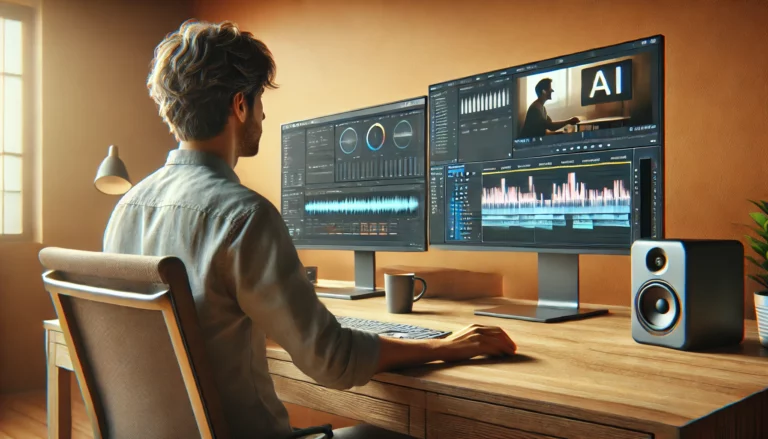You really want your videos or radio ads to shine? Or, is it explainer videos or special corporate material that you need a voice actor to record? The voice actors, engineers, and others involved can’t just do it by themselves. They would certainly need your involvement. Specifically, that involvement is directing voice over talent.
You surely understand that you need to provide some level of direction to your voice actors. You can’t just expect to hand someone a piece of paper and set him or her in front of a microphone. That should not make you think your job is done. To be able to do that those in charge have to have a certain level of understanding what directing a voice actor entails.
Ok, so you’ll give them the script and a brief background about the audience you are trying to reach. But, by giving them the script and background on their audience is just touching the tip of the iceberg. The director has to help the voice actor understand the intentions behind the script and guide them through any of the myriads of technical issues that might arise. Here are a few of the things that talent will need from a director in the studio.
As an experienced voice actor puts it, “thoughtful direction is extremely helpful to the voice-over talents who strive to do their job well. Voice talent will take responsibility for interpreting a script, but a director’s input greatly assists the process.”
There is always a set of steps you need to undertake when directing voice-over talent. Before, during, and after the recording to make sure everything goes according to plan. Here is a general overview of the process of directing voice talent.
What needs to be done before the recording
Debbie Grattan is one of the more experienced voice actors around who runs her own voice acting blog. There, she succinctly explains what the directing process involves even before the recording process starts.
The first step involves identifying the voice actor’s role. “Is your talent playing the bold announcer? The knowledgeable educator? The gentle best friend? Let them know the role the voice is playing. An experienced voice over actors will create their own personal back story to get into that role and execute it with conviction.”
In the second step, you need to explain to the voice actor(s) clearly who will be your audience. Share specific details about your target audience to ensure the talent knows to whom he or she is speaking. What will the VO be used for? Where will it be played? Who are we talking to?
The third element involves explaining the purpose of your recording. You have to be able to explain to your voice artist in every little detail what the purpose of the voice-over is. That means having a specific target market you want to reach and a definite message you want them to take away from the campaign. If your talent doesn’t understand the purpose of their voiceover, it will be extremely hard for them to deliver a recording with the proper emotional tone and rhythm.
For instance, the voice talent will say their lines very differently if the target market is 18-24-year-olds as opposed to 40-50-year-olds. Same if the target is men instead of women or vice versa. They’ll also want to adjust their tone if the campaign is supposed to project an air of professionalism and authority rather than playfulness and excitement.

Directing voice-over talent – handling logistics and other elements
As the director, you want to make sure all the technical aspects are taken care of ahead of time. That means quite a few things. All the equipment is properly set up, any necessary documents are prepared. Any questions relating to pronunciation or synchronization have to already been answered. You want your voice talent to be focused solely on delivering quality performance. This means it’s up to you to eliminate any distractions.
Depending on the size of the project, you might also have other people involved in setting up and managing the equipment/studio space, but the ultimate responsibility is on your shoulders. You have to be accountable for ensuring that everything the voice artist needs to deliver a quality performance is ready ahead of time.
If, however, you don’t feel like investing in expensive studio equipment, Bunny Studio offers tons of affordable actors who already have their ideal setup. Choose from a variety of actors including ones that specialize in female voiceovers.
Before the recording begins, you should describe your desired sound to the voice actor(s). You should “use highly specific descriptive words to indicate how you want a script to sound. Good choices are words like warm, friendly, concerned, emotionless, comic, serious, quirky, hip, brassy, sassy, movie-trailer big.”
Using already recorded examples will certainly alleviate your job. You can do this by using recordings from the voice actor’s portfolio that you previously had. Or, you can present a recording (or a link to a recording) of the vocal sound you need. Also, letting the voice actor preview the possible video recording or the music that will go along will help them immensely get the right idea that you need.
The use of the script and communicating as part of directing the voice-over talent
The voice actor should have before them a script that is as ready as possible for the recording. This would mean that you or somebody else have read it aloud to check how it sounds. You can add remarks on what needs to be accentuated. Even phonetic spelling can be very helpful. Also, bear in mind that the numbers in the script have to be spelled out.
The script should include the exact timeframes, particularly if you are cording a video. The script has to be accurately timed. “Most pros work with a stopwatch in hand and are extremely aware of how to fit copy into the desired timeframe. But also, make sure that the copy can fit into the timeline” (Debbie Grattan – above).
“If certain parts of the script require voice over acting moments, use brackets to outline specific emotions and tones to hit at those points. Remember to keep those emotions and tones very specific, avoiding the too-general terms like ‘nice’ or ‘conversational.’ Try terms like ‘happily surprised,’ ‘shocked and angry’ or ‘unemotional and stoic’ instead.”
Of course, the directing activity doesn’t stop during the recording itself. It might seem too easy just to sit back and let the voice actor do several read-throughs without interfering. Especially if the person has significant experience with voice acting and you haven’t done much directing, it’s easy to let them do what they usually do and just stay out of the way.
Being too shy, however, can really hurt the creative process. Your voice actor needs feedback. No matter how many times you’ve explained the script to them, it’s unlikely that they understand the nuances and overall vision to the same extent that you do.
Directing voice-over talent – nuances can make or break your recording quality
The actor is relying on you to give them high-quality feedback on their performance so they can come closer to your vision on the next take. Listen to how much even an experienced voice actor communicates with their director between takes in this video.
Don’t be afraid to get very specific. Tell the voiceover artist what syllables to emphasize, where to speed up slightly and where to slow down for effect. You know how the script sounds in your head, so explain it to them so that they can make the sound come alive.
There are two elements that experienced directors of voice talent always have in mind – that is the mood and the atmosphere during the recording itself. According to another experienced voice actor, this will likely “have the most overall impact on how a VO will sound in the final product.” He also notes that “the environment where the VO is recorded affects mood, which therefore affects the talent and final product.
Studios that have natural light, a larger room, and “stand up” microphones lend to not only a more comfortable atmosphere but also encourage physical adaptation to the spoken word – the talent can stand and move around a bit.” That is why it is sometimes good to let professionals like Bunny Studio handle these things.
As the director, it’s your job to manage everyone’s time in the studio and make sure that time is being used as productively as possible. That means it’s up to you to decide how many takes need to be done when it’s time to move on to recording a different part, and when it’s time to take a break. Also, always have in mind and consider the input of all involved. That includes the recording engineers and all the supporting staff.

Directing voice-over talent – always remain in control
You in the role of the director always have to be in control. If the artist clearly is struggling with a certain line, give them a break so they can compose themselves. If you’re in danger of running over the schedule, find a way to reduce the time between takes. In general just make sure everything runs smoothly, quickly, and efficiently.
Experienced voice talent might be able to come into the studio and instantly feel comfortable, but newer artists will probably need some help getting relaxed and confident. As the director, it’s your job to get them to the place where they can deliver a good performance. That might mean joking around with them or giving plenty of encouraging feedback. It might even just mean having little comforts like water close at hand.
Most importantly, let the talent know that you’re in control. Put them at ease by taking charge and getting things moving. Project an aura of calm and certainty, even if you’re not sure you really know what you’re doing. Ideally, try to make the whole experience fun. After all, both of you should be in this business because it’s what you love doing.
Still, there might be recording situations where things turn out to be a bit too complex and need involvement by experienced professionals. If you do find yourself in the position of being unsure because of inexperience, be sure to consult Bunny Studio’s extensive options for affordable, experienced advertising voiceover actors who will work with you to ensure you’re happy with the project. Remember: You have the easy job here, and if the artist thinks that you look nervous or unsure, they’re going to start feeling the same way. The experience levels of the directors, voice actors, and all involved should be close in level.










